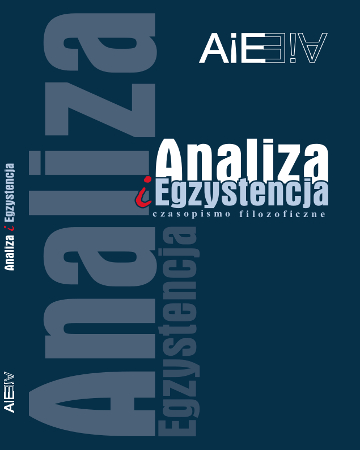
ISSN: 1734-9923
eISSN: 2300-7621
OAI
DOI: 10.18276/aie.2017.38-01





Lista wydań /
38 (2017)
Dziecko i filozofia. Spór o filozofowanie dzieci
| Autorzy: |
Paweł
Walczak
Instytut Filozofii Uniwersytet Zielonogórski |
| Słowa kluczowe: | metaphilosophy philosophy of education child’s philosophizing childhood developmental psychology |
| Data publikacji całości: | 2017 |
| Liczba stron: | 15 (5-19) |
Abstrakt
The answer to the question of child’s philosophizing requires the prior decisions
on fundamental issues in areas such as metaphilosophy, epistemology, psychology
and pedagogy. The position in the dispute over a child’s philosophy is usually the
consequence of adopting a certain attitude towards issues related to understanding
the nature of philosophy itself, what childhood is, how human cognitive competences
develop, and what the education is and what it should be. Supporters of
child’s philosophizing probably have different definition of the philosophy, they
also have another vision of child’s cognitive development than philosophers who
are skeptical towards philosophy practiced by children. In this paper I will attempt
to order the arguments of supporters and skeptics of child’s philosophizing, stressing
the importance of various authors’ positions on issues which are substantial for the
problem of child’s philosophizing. A special role in this dispute plays criticism of
Piaget’s theory of development of cognitive competences. According to critics of
Piaget, he is focused on constructing a model of development and does not notice
the phenomenon of child’s philosophizing. Children are in the wrong at any stage of
development. But their mental constructions are essentially brilliant philosophical
problematizing of the world.
Pobierz plik
Plik artykułu
Bibliografia
| 1. | Adorno, T. (1957/1958). Vorlesung zur Einleitung in die Erkenntnistheorie. Frankfurt |
| 2. | am Main: Goethe-Universität. |
| 3. | Egan, K. (1988). Primary Understanding: Education in Early Childhood. London: |
| 4. | Routledge. |
| 5. | Horkheimer, M. (1970). Die Sehnsucht nach dem ganz Anderen. Ein Interview mit |
| 6. | Kommentar von Helmut Gumnior. Hamburg: Furche Verlag. |
| 7. | Kitchener, R. (1990). Do children think philosophically? Metaphilosophy, 21 (4), |
| 8. | 416–431. |
| 9. | Lipman, M. (1991). Thinking in Education. Cambridge MA: Cambridge University |
| 10. | Press. |
| 11. | Lipman, M., Sharp, A.M., Oscanyan, F.S. (1997). Filozofia w szkole. Warszawa: |
| 12. | CODN. |
| 13. | Matthews, G. (1978). The child as natural philosopher. W: M. Lipman, A.M. Sharp |
| 14. | (red.), Growing up with philosophy (s. 63–77). Philadelphia: Temple University |
| 15. | Matthews, G. (1984). Dialogues with Children. Cambridge MA: Harvard University |
| 16. | Matthews, G. (1994). The Philosophy of Childhood. Cambridge MA: Harvard |
| 17. | University Press. |
| 18. | Martens, E. (2011). Dzieci są filozofami. Ethics in Progress Quarterly, 2 (1). Pobrano |
| 19. | z: http://ethicsinprogress.org. |
| 20. | Murris, K. (2000). Can Children Do Philosophy? Journal of Philosophy of Education, |
| 21. | 34 (2), 261–279. |
| 22. | Murris, K. (2001). Are children natural philosophers? Teaching Thinking, 9, 46–49. |
| 23. | Piaget, J. (1933). Children’s philosophies. W: C. Murchison (red.), Handbook |
| 24. | of Child Psychology. Worcester: Clark University Press. |
| 25. | Sloterdijk, P. (1983). Kritik der zynischen Vernunft. Bd. 1. Frankfurt am Main: |
| 26. | Suhrkamp. |
| 27. | Szczepska-Pustkowska, M. (2011). Od filozofii dzieciństwa do dziecięcej filozofii |
| 28. | życia. Casus władzy (i demokracji). Kraków: Oficyna Wydawnicza Impuls. |
| 29. | Śliwerski, B. (2007). Pedagogika dziecka. Studium pajdocentryzmu. Gdańsk: GWP. |
| 30. | White, J. (1992). The roots of philosophy. W: A.P. Griffiths (red.), The Impulses to |
| 31. | Philosophise (s. 73–88). Cambridge: Cambridge University Press. |